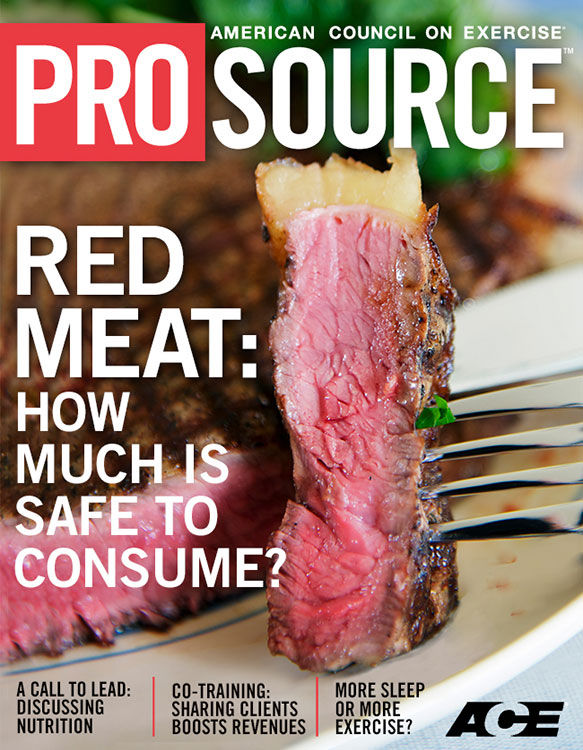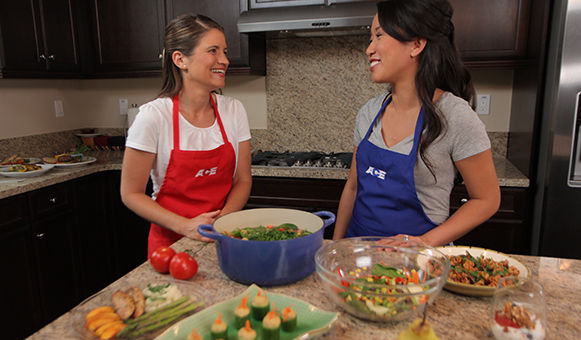
The statistics are staggering and well known to most fitness professionals. A global obesity epidemic is underway, stubbornly refusing to improve despite massive amounts of resources, attention and advocacy. Millions of U.S. adults—and now a burgeoning number of children—suffer from prediabetes or diabetes. In fact, one study estimates that one in three children born in the year 2000 will at some point in their lives develop diabetes (Narayan et al., 2003). In addition, cardiovascular disease is the leading killer in the U.S., responsible for nearly 600,000 deaths each year (Hoyert and Xu, 2013).
Each of these conditions is directly impacted by lifestyle choices—a combination of physical inactivity and poor nutritional intake. In fact, the prevalence of these diseases can be dramatically improved, if not reversed, or wholly prevented by a physically active lifestyle and wholesome and balanced nutrition choices. One recent study found that someone who follows a Mediterranean eating plan, maintains a normal weight, is physically active and has never smoked has an 80 percent decreased risk of death over eight years (Ahmed et al., 2013).
Despite a relatively widespread understanding of the role of activity and nutrition in optimizing health, very few people actually follow physical-activity and dietary guidelines—but many want to. And millions of people walk through the doors of a health club, medical fitness facility, studio or other locale to engage in some type of physical activity led or coached by an ACE-certified professional. They want to get fit. They want to achieve their health and wellness goals. They want to know more about nutrition. A fitness professional who focuses only on physical activity and avoids discussing nutrition is providing that client with less than optimal service.
Of course, fitness professionals are not nutrition “experts.” Generally, that designation is reserved for registered dietitians and others with advanced degrees in nutrition. However, fitness professionals don’t have to be nutrition “novices” either. With a clear understanding of what is and is not within their scope of practice, fitness professionals can effectively help their clients to achieve their goals, whether through direct provision of information and tools or through referral to a registered dietitian, when appropriate.
Defining Scope of Practice
Scope of practice refers to the range and limit of responsibilities normally associated with a position, job or profession. Scope of practice is determined by rules and regulations as determined by state laws and statutes, the roles and responsibilities as outlined by a certifying or accrediting body, and an individual’s education and training.
State Laws and Regulations
Most states have laws regulating the practice of dietetics. Forty-seven states regulate nutritionists in one of the following three manners:
- Licensure, in which state statute articulates a clearly defined scope of practice. Providing nutrition counseling without the requisite training and possession of a license is illegal. In these states, individuals who practice the profession without a license and who are not specifically exempt are subject to legal action. Most states require licensure.
- Statutory certification, in which individuals must meet specific requirements to be eligible for certification; however, non-certified individuals can still practice the profession. Though the rules are much less stringent in these states compared to those requiring licensure, laws are constantly changing. Fitness professionals practicing in these states should carefully review the legislation with the assistance of an attorney to ensure full compliance with the rules.
- Registration,in which state statute limits who is allowed to refer to him- or herself as a “registered dietitian” or “dietitian,” but does not limit who can practice the profession. California is the only state that requires registration.
Only three states—Arizona, Colorado and New Jersey—do not have any laws regulating the field of nutrition.A state map showing the classification of each of the 50 states is included in Figure 1.
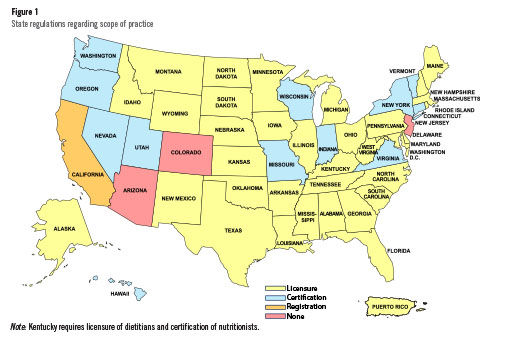
Keep in mind that state laws are constantly evolving and changing. Up-to-date information is available on the Commission for Dietetic Registration website.
In states without licensure, anyone can legally provide nutrition services, though it may be considered unprofessional or unethical for individuals without the appropriate education and training or competencies and skills to do so. Ultimately, state requirements take precedence in determining minimal scope of practice requirements. For example, while a fitness professional in Colorado may legally be allowed to call himself a “nutritionist” and provide nutrition counseling, a fitness professional with the same education, experience and fitness certification in Illinois could face a $5,000 penalty each for calling himself a “nutritionist” or for providing nutrition counseling.
Education and Training
The limitations to scope of practice dictated by state laws trump the other determinates of scope of practice such as education and training or expertise and skill level. However, regardless of the presence or absence of legal restrictions, any services offered should be consistent with a fitness professional’s education and training. Most fitness certifying bodies and professional organizations include a statement outlining the professional’s scope of practice (see box, Scope of Practice: ACE Position Statement on Nutrition Scope of Practice for Fitness Professionals).
ACE Position Statement on Nutrition Scope of Practice FOR FITNESS PROFESSIONALS
It is the position of the American Council on Exercise (ACE) that fitness professionals not only can but should share general nonmedical nutrition information with their clients.
In the current climate of an epidemic of obesity, poor nutrition, and physical inactivity paired with a multibillion dollar diet industry and a strong interest among the general public in improving eating habits and increasing physical activity, fitness professionals are on the front lines in helping the public to achieve healthier lifestyles. Fitness professionals provide an essential service to their clients, the industry, and the community at large when they are able to offer credible, practical, and relevant nutrition information to clients while staying within their professional scope of practice.
Ultimately, an individual fitness professional’s scope of practice as it relates to nutrition is determined by state policies and regulations, education and experience, and competencies and skills. While this implies that the nutrition-related scope of practice may vary among fitness professionals, there are certain actions that are within the scope of practice of all fitness professionals.
For example, it is within the scope of practice of all fitness professionals to share dietary advice endorsed or developed by the federal government, especially the Dietary Guidelines for Americans (www.dietaryguidelines.gov) and the MyPlate recommendations (www.ChooseMyPlate.gov).
Fitness professionals who have passed National Commission for Certifying Agencies (NCCA)– or American National Standards Institute (ANSI)– accredited certification programs that provide basic nutrition information, such as those provided by ACE, and those who have undertaken nutrition continuing education, should also be prepared to discuss:
• Principles of healthy nutrition and food preparation
• Food to be included in the balanced daily diet
• Essential nutrients needed by the body
• Actions of nutrients on the body
• Effects of deficiencies or excesses of nutrients
• How nutrient requirements vary through the lifecycle
• Information about nutrients contained in foods or supplements
Fitness professionals may share this information through a variety of venues, including cooking demonstrations, recipe exchanges, development of handouts and informational packets, individual or group classes and seminars, or one-on-one encounters.
Fitness professionals who do not feel comfortable sharing this information are strongly encouraged to undergo continuing education to further develop nutrition competency and skills and to develop relationships with registered dietitians or other qualified health professionals who can provide this information. It is within the fitness professional’s scope of practice to distribute and disseminate information or programs that have been developed by a registered dietitian or medical doctor.
The actions that are outside the scope of practice of fitness professionals include, but may not be limited to, the following:
• Individualized nutrition recommendations or meal planning other than that which is available through government guidelines and recommendations, or has been developed and endorsed by a registered dietitian or physician
• Nutritional assessment to determine nutritional needs and nutritional status, and to recommend nutritional intake
• Specific recommendations or programming for nutrient or nutritional intake, caloric intake, or specialty diets
• Nutritional counseling, education, or advice aimed to prevent, treat, or cure a disease or condition, or other acts that may be perceived as medical nutrition therapy
• Development, administration, evaluation, and consultation regarding nutritional care standards or the nutrition care process
• Recommending, prescribing, selling, or supplying nutritional supplements to clients
• Promotion or identification of oneself as a “nutritionist” or “dietitian”
Engaging in these activities can place a client’s health and safety at risk and possibly expose the fitness professional to disciplinary action and litigation. To ensure maximal client safety and compliance with state policies and laws, it is essential that the fitness professional recognize when it is appropriate to refer to a registered dietitian or physician. ACE recognizes that some fitness and health clubs encourage or require their employees to sell nutritional supplements. If this is a condition of employment, ACE suggests that fitness professionals:
• Obtain complete scientific understanding regarding the safety and efficacy of the supplement from qualified healthcare professionals and/or credible resources. Note: Generally, the Office of Dietary Supplements (ods.od.nih.gov), the National Center for Complementary and Alternative Medicine (nccam.nih.gov), and the Food and Drug Administration (FDA.gov) are reliable places to go to examine the validity of the claims as well as risks and benefits associated with taking a particular supplement. Since the sites are from trusted resources and in the public domain, fitness professionals can freely distribute and share the information contained on these sites.
• Stay up-to-date on the legal and/or regulatory issues related to the use of the supplement and its individual ingredients
• Obtain adequate insurance coverage should a problem arise
Beyond their fitness-related certification, many fitness professionals recognize the value in receiving additional training or certification in nutrition. In these cases, they have spent many hours learning about nutrition and likely have expanded their ability to effectively and accurately answer clients’ questions. While education such as the ACE Fitness Nutrition Specialty Certification broadens a fitness professional’s expertise, fitness professionals should be careful to follow the scope of practice guidelines set forth by the certifying or professional organization that offered the advanced training and recognize the limitations to their education and training. In some cases, a fitness professional may choose to pursue additional training to become a registered dietitian or attain an advanced degree in nutrition, which further expands scope of practice.
ACE’s Nutrition Tools and Resources for Fitness Professionals
The American Council on Exercise recognizes that fitness professionals need tools to help translate nutrition guidelines into actionable recommendations and to help clients successfully implement behavioral changes to achieve their nutritional goals. That is why ACE has put together a lineup of offerings to help ACE professionals achieve success with their clients.
ACE Fitness Nutrition Specialty Certification
The ACE Fitness Nutrition Specialty Certification takes an application-based, interactive approach to preparing fitness professionals to provide practical, actionable tips to their clients while staying within their scope of practice. With topics ranging from nutrition fundamentals and an in-depth discussion of dietary guidelines to nutrition coaching to how to integrate nutrition coaching into your business, the Fitness Nutrition Specialty Certification guides you from start to finish in incorporating nutrition into your interactions with clients.
ACE Health Coach Certification
We know that it takes more than knowing what to eat and how to exercise to help mobilize people to make behavioral changes. The health coach leads the charge to convert “recommendations” to eat better and move more into real-world change using tools like motivational interviewing, coaching psychology, effective goal-setting strategies and adult education techniques. The result? Increased client ownership of the changes and, subsequently, impressive outcomes, including sustained weight loss, decreased risk of chronic disease and improved quality of life. The ACE Health Coach curriculum prepares ACE-certified Professionals to “lead change.”
Evolution Nutrition Meal Planning Program
Developing individualized meal plans is outside the scope of practice of fitness professionals, but many clients request specific plans to help them know what to eat to achieve their goals. A personal registered dietitian is not always immediately available or an option for a client. The Evolution Nutrition Meal Planning Program allows fitness professionals to merge the expertise of a registered dietitian who specializes in sports nutrition to design customized performance nutrition plans with the exercise expertise they deliver to their clients. ACE has worked closely with Evolution Nutrition to create a mobile, web-based diet-planning application created by experts in the field, driven by science-based formulas and world-class nutrient analysis. By simply inputting a client’s gender, height, weight and weight goals, Evolution Nutrition helps professionals provide clients with meal plans with the appropriate calories and macro- and micronutrients for each individual. The program is two-sided: one side for clients to log in to record their diet and training, and receive their plans. The other side can only be accessed by the ACE-certified professional, and allows access to the diet and exercise planning tools needed to support the health and training of clients.
Through this program, fitness professionals can plan, coach and support their clients every step of the way. And fitness professionals can be confident in the plans they deliver to clients because the formulas and menu planning behind the detailed calculations and comprehensive database of foods, recipes, meal plans and exchange lists are built by registered dietitians and adhere to the consensus of modern sports nutrition science. Fitness professionals no longer have to guess or spend valuable time trying to evaluate how to address diet-programming needs on their own, or worry about operating outside their defined scope of practice. Clients will consistently get better results because fitness professionals can now deliver professionally designed nutrition programs to suit each client’s specific needs. These programs provide science-based information, coaching compliance and accountability, freeing up the fitness professional’s valuable time to focus and apply exercise expertise. By using this program, fitness professionals can make their work easier, faster, and more organized, accurate and efficient.
ACEFit.com
Whether you work with your client one day per week or five, you can’t always be there when your client needs to make decisions about his or her workout program or about what or how to eat. ACE’s public outreach efforts include a website that serves as a tool for ACE professionals and a resource for clients—ACEfit.com. From workouts and nutrition information, tools and videos to an extensive library of recipes, ACEfit.com is there to help you help your clients to live their most fit lives.
Competencies and Skills
Fitness professionals should work within their own set of competencies and skills. For example, while one fitness professional may have a special interest and expertise in obesity prevention, another may work primarily with athletes and be interested in nutrition to improve sports performance. Prior to sharing a piece of information or initiating a nutrition discussion, fitness professionals should ask themselves whether or not the activity is within their scope of practice, training and skills. If the answer is “no” or if the fitness professional is unsure, referral is likely warranted.
As a fitness professional considers what nutrition information is or is not appropriate to incorporate into sessions with clients, it is important to highlight certain actions that are well within the scope of practice of nearly all qualified fitness professionals and not only can be shared with clients, but should be shared to help the client receive the highest quality service.
Nutrition Content All Fitness Professionals Should Share

Given the alarming worldwide obesity epidemic, the eagerness of the general population to learn more about nutrition, and the large amount of nutrition misinformation readily available and perpetuated online, in magazines and through misinformed and unqualified individuals, fitness professionals should discuss nutrition with their clients. All fitness professionals should share the dietary recommendations and guidelines endorsed by the federal government, especially the Dietary Guidelines for Americans and the MyPlate recommendations. While historically many fitness professionals have considered these guidelines to be limited and basic, they actually contain a wealth of nutrition information and resources. In fact, if most people followed these recommendations (currently very few do), the nutritional status of Americans would be much higher and relatively few people would be overweight or obese.
Several other nutrition tools also are available for fitness professionals to use while staying well within their scope of practice. For example, the federal government’s SuperTracker tool provides an opportunity to help clients participate in food logging, meal planning and goal setting, all in accordance with the Dietary Guidelines.
Nutrition Content ACE Fitness Nutrition Specialists and Others With Advanced Training in Nutrition Should Share
While most states that require licensure of nutritionists emphasize what non-licensed persons cannot do, Ohio’s statute serves as a useful example to help clarify scope of practice for “nonlicensed individuals;” that is, individuals such as ACE Fitness Nutrition Specialists who have occasion to discuss nutrition, but who do not have the registered dietitian credential and state license, where necessary. In Ohio, unlicensed individuals can provide “general nonmedical nutrition information,” which includes, but is not necessarily limited to, the following:
- Principles of good nutrition and food preparation
- Food to be included in the normal daily diet
- Essential nutrients needed by the body
- Recommended amounts of essential nutrients
- Actions of nutrients on the body
- Effects of deficiencies and excesses of nutrients
- Food and supplements that are good sources of essential nutrients
Unlicensed individuals also may freely disseminate nutrition information, including information on vegetarian diets, alternative diet philosophies, government or agency nutrition literature, books and articles. Unlicensed individuals may also deliver a weight-management program that has been approved in writing by a physician or registered dietitian (Ohio Board of Dietetics, 2004).
While this statute legally applies directly only to fitness professionals living in the state of Ohio, these general guidelines serve as a useful and constructive outline from which to build knowledge and competency for ACE Fitness Nutrition Specialists. As such, the guidelines form the foundation for the ACE Fitness Nutrition Specialty certification and ACE’s Position Statement on Nutrition Scope of Practice. ACE Fitness Nutrition Specialists are encouraged to share this information through a variety of venues, including cooking demonstrations, recipe exchanges, development of handouts and informational packets, and individual or group classes and seminars.
Nutrition Content Fitness Professionals and ACE Fitness Nutrition Specialists Should NOT Share
Certain nutrition content is best left to a qualified nutrition professional who holds the necessary training and credentialing to ensure the client’s safety and to best meet the client’s need. This includes:
- Medical nutrition therapy. Medical nutrition therapy is a term that refers to the provision of individualized nutrition assessment and dietary recommendations to help manage disease. Medical nutrition therapy is recognized by Medicare as the domain of the registered dietitian. Clients who have underlying medical diagnoses and illnesses should be encouraged to undergo a nutritional assessment from a registered dietitian. The fitness nutrition specialist may then help the client follow the dietitian’s nutrition recommendations.
- “Nutrition assessment,” “nutrition counseling,” meal planning or individualized nutrition recommendations. The assessment of an individual’s nutritional status and the provision of individualized nutrition recommendations or counseling are outside the fitness professional’s scope of practice. A registered dietitian takes into consideration the client’s full medical history, medications, background and family history, and many other factors when developing a dietary program. Fitness professionals are often not privy to this information and not trained in how to interpret and manage abnormal findings. However, fitness professionals can use government resources such as the USDA’s SuperTracker to help clients access a personalized plan based on the Dietary Guidelines. In addition, fitness professionals may share nutrition information or meal plans developed by a registered dietitian, such as the meals plans offered through Evolution Nutrition, an ACE collaborative partner (see ACE’s Nutrition Tools and Resources for Fitness Professionals).

- Supplement guidance and recommendations.Supplement use is widespread among health enthusiasts, athletes and other individuals that seek the services of the fitness professional. In addition, many fitness facilities promote and sell supplements. As such, fitness professionals frequently field questions about supplements from clients. Due to the potential risks of supplement use, fitness professionals should never advise a client to take a supplement. However, fitness professionals can share information about supplements. When sharing information about supplements, it is important that the client understands that the fitness professional is not recommending or endorsing the supplement. Clients that are considering supplement use should be referred to a qualified medical professional or registered dietitian (see box, Referral to a Registered Dietitian).
- Promotion of credentials as a “nutritionist” or “dietitian.” Most states prohibit promotion of oneself as a “nutritionist” or “dietitian” without verification of specific credentials. Fitness professionals who do not hold these credentials and have not been verified by the state licensing or registration board should NOT refer to themselves or promote themselves as nutritionists or dietitians.
Referral to a Registered Dietitian
One of the most important ways that an ACE Fitness Nutrition Specialist can gain credibility among other allied health professionals and develop strong relationships with registered dietitians is to “speak the language” of the other professional and thereby establish an effective referral process. This four-step plan will help fitness professionals get started.
•Identify a qualified professional: The first step to initiating a referral is to identify a nutrition professional who you trust. You may identify this person through word of mouth and a recommendation from another allied health professional, through the database of registered dietitians maintained by the A.N.D. (available at www.eatright.org), through the facility where you work, or through other venues.
•Establish a connection: Before referring clients to an individual, it is helpful to establish a connection and relationship with that person. Not only does this communication help to increase the likelihood of success for the client, but it may also help to have a ready contact for future referral and generate return referrals in exchange. There are several ways to establish this connection: a brief introductory phone call or email, following up on a recommendation from another professional or client, or networking through professional meetings, joint acquaintances, or organized networking events, for example.
•Make the referral: Once you have determined to whom to refer a client, the next step is to make the referral. To be most effective, it is important to make the referral in writing. The referral letter should include (1) your name, credentials, and contact information; (2) a brief one- or two-line background about the client; and (3) the reason for referral.
•Follow up: Follow up with both the registered dietitian and your client after the client has visited with the registered dietitian. You can play an important role in helping to reinforce the messages and recommendations provided by the registered dietitian and also help to monitor the client’s progress. To strengthen your relationship with the registered dietitian, write a brief follow-up letter acknowledging that you received the recommendations and will fulfill your intended role by helping the client achieve success with the recommendations. This follow-up letter helps to improve care for the client and demonstrates your professionalism.
Summary
As nutrition and exercise are both critical to achieve optimal health, fitness professionals are encouraged to share nutrition information with their clients. In those cases in which a client requests individualized nutrition information or when a client has a medical diagnosis that requires special nutrition recommendations, fitness professionals may serve their clients best by referring them to their physician and/or a registered dietitian for an individualized eating plan. The fitness professional still plays an important role in providing support and encouragement for the client to follow the recommended plan. Ultimately, when health professionals work together to help clients reach their goals, everyone benefits: the client receives the best care, while both professionals strengthen their networks and increase their credibility.
References
Ahmed, H.M. et al. (2013). Low-risk lifestyle, coronary calcium, cardiovascular events, and mortality: Results from MESA. American Journal of Epidemiology, DOI:10. 1093/aje/kws453.http://aje.oxfordjournals.org.
American Council on Exercise (2013). ACE Fitness Nutrition Manual. San Diego: American Council on Exercise.
Hoyert, D.L. & Xu, J. (2012). Deaths: Preliminary Data for 2011. National Vital Statistics Reports, 61, 6. Retrieved June 12, 2013:
Narayan, K.M. et al. (2003). Lifetime risk for diabetes mellitus in the United States. Journal of the American Medical Association, 290, 14, 1884–1890.
Ohio Board of Dietetics (2004). Bulletin # 8: General Non-medical Nutrition Information.
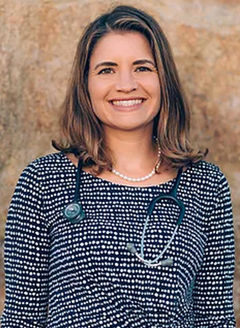




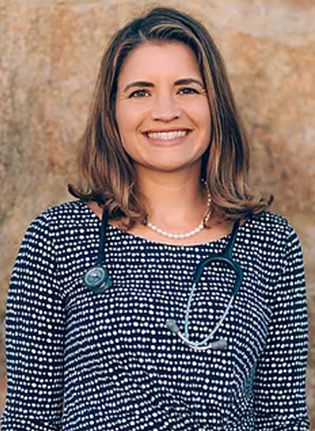 by
by 